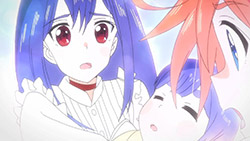 |
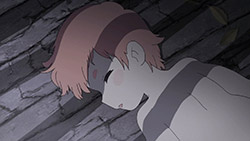 |
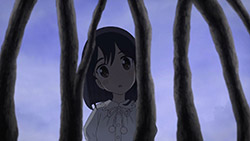 |
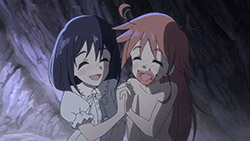 |
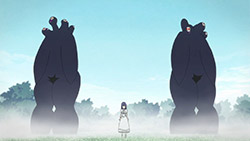 |
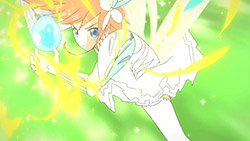 |
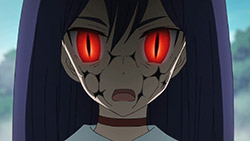 |
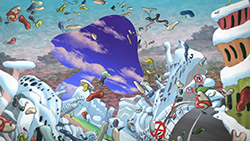 |
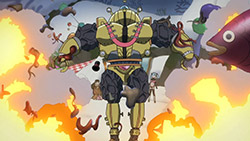 |
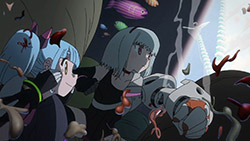 |
 |
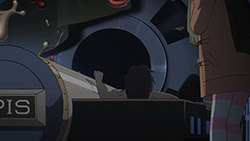 |
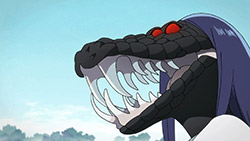 |
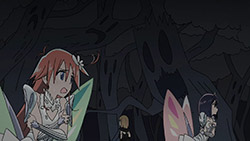 |
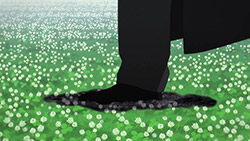 |
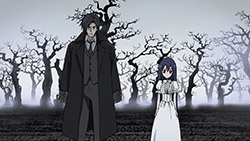 |
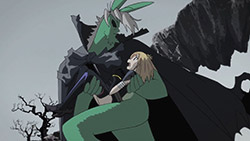 |
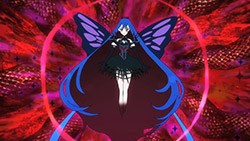 |
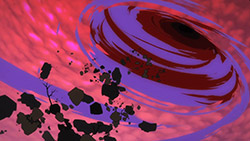 |
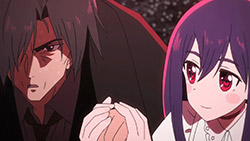 |
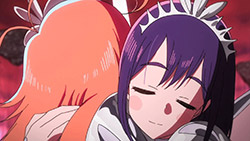 |
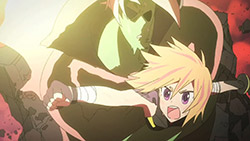 |
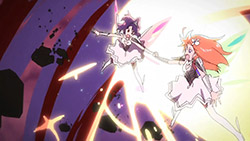 |
 |
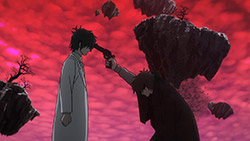 |
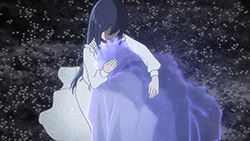 |
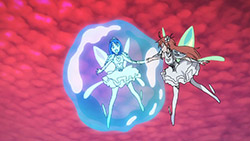 |
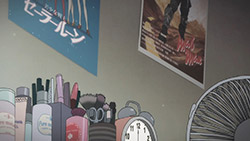 |
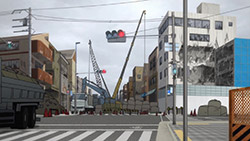 |
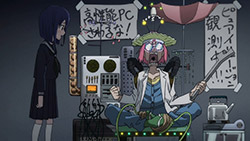 |
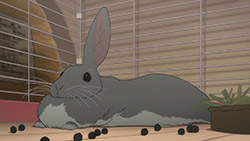 |
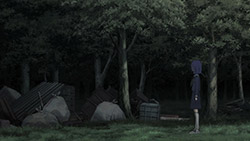 |
 |
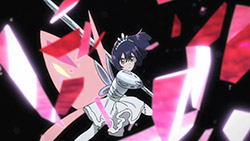 |
 |
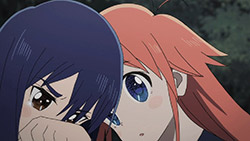 |
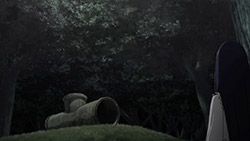 |
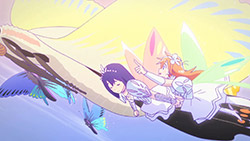 |
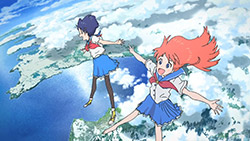 |
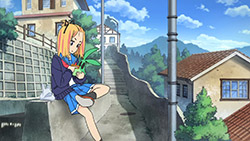 |
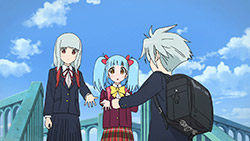 |
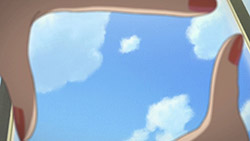 |
「ピュアオーディオ」 (Pyuaōdio)
“Pure Audio”
Almost, almost an Inception-ending for Flip Flappers, but thankfully, bullet dodged. Not that I didn’t enjoy seeing the grey world where the magic is gone; I think it’s a necessary contrast to all the all of Flip Flappers weird and wonderful, even outside of Pure Illusion. It’s the sort of thing I think we need to be shown at least, as the closest thing to ‘Cocona’s World’—or at least the world she thought she wanted. She’s the protagonist, so this is a necessary development. To end it at that, though, will be a tad too depressing, so although the fake-out is definitely cheating, I’m fine with it. This is, after all, a magical girl show! I’ll accept nothing less than a happy ending for everybody. Zettai daijoubu dayo!
So, yeah, this finale does pretty much everything I want a finale to do. With the advent of the Apocalypse, the stakes were about as high as it ever could be (when Wicked!Mimi said she ‘knew the words’ it definitely made me fret for our protagonists). There was some tasty action to go with the climax. And the story was, more or less, resolved. True, there are still a few questions (okay, many questions) that are yet to be answered (like what Pure Illusion actually is, what Mimi actually is, what the what), but I’ve never considered the answering of questions to be very important for Flip Flappers. It is definitely at its strongest when it is being weird and unexplained, to match the psychedelic visuals. If everything was just a vehicle for the artistic imagery I’d actually be sort of fine with that, but Flip Flappers goes one step further. Where Flip Flappers progresses most is in the furtherance of its themes, and I found that to be much more important than the plot. Flip Flappers is about the nature of love and how it plays into one’s identity, and a discussion of maternal love is the best way to cap it off. Sure, having two actual Mimis playing two different kinds of mothers is not the most subtle fare (especially when one turns into an evil snake), but the point was made well enough. I’m satisfied. And with that, onto the final impressions!
Final Impressions ~ Reality Is Overrated
What a great show Flip Flappers was. I’m sorry for ever thinking any different. When I first watched the first episode I was intrigued, but also had a fear that Flip Flappers would just be a strange, directionless thing. There are many anime that are artistically distinct or visually impressive. Often, though, that is the end of it. Such is the nature of the medium. Anime directors invariably start as animators, and are not necessarily well-versed in the craft of storytelling. It’s one thing to have pretty art, and another to use it to actually say something. While style can go far to compensate for a lack of substance, any show still needs both if it aspires to greatness. Thankfully, Flip Flappers isn’t just artsy for the sake of being artsy (not totally, anyway). Its style is always part of its expression, and it almost always has something to say.
Yes, Flip Flappers is strange. Yes, it’s sometimes confusing. But it’s never actually too hard to follow. It’s influences are always fairly clear, and the overarching plot not actually that important. While Flip Flappers does try for an overarching plot and we do need to keep up with that, Flip Flappers is actually the most effective and memorable when it’s more episodic, telling a specific slice of story and leave the plot to progress in the background. The strongest of Flip Flappers for me is undoubtedly episode 05 and episode 06, where Flip Flappers is mostly concerned about portraying yuri-as-horror, or telling a simple story about a child coming to terms with dementia. In fact, they are some of the best episodes of anime I’ve ever watched. They are the episodes where Flip Flappers was the most comfortable with being surreal and abstract, and to use those tools to tell a story. While the rest of Flip Flappers from there, and its focus on a plot, was still ‘good’ by all means, nothing else really compared to those middle episodes.
Basically, Flip Flappers was strongest when it was truest to its nature—and arguably the fundamental nature of anime. The strength of Flip Flappers is, I would say, the strength of the anime medium as a whole. Anime isn’t realistic, and that’s a great thing. When talking about CG animation, or video games, there seems to be this assumption that they must strive towards graphical realism. They are criticised, sometimes, if they look too ‘cartoony’. Even anime is lauded when its art (especially backgrounds) look ‘realistic’. That’s all well and good, and beauty is in the eye of the beholder, but I think it’s important that we keep in mind that anime doesn’t have to be realistic. If it’s made by people drawing frames, it’s not confined to realism. Draw whatever is effective in communicating the story. I mean, it’s not like reality has a score, yet all shows use background music to build mood and atmosphere. Why not be flexible with the aesthetic as well? When a show like Flip Flappers experiments with visual expression, I’m all for it, because its style is unique to the hand-drawn medium. It does not need to limit itself to the world as we see it, but addresses the world as we experience it—which is much more than photos, no matter how detailed. Obsess yourself not with reality, but with truth. That is art. That is Flip Flappers. That is anime.

Goodbye to my favorite series this season
Side A, Side B
Unfortunately one of the biggest dissapontiments I ever had.
First half touched and suggested questions and themes that were abandoned in the second half to introduce others, and they were poorly developed with ridiculous phrases and dialog.
Like people were saying, it’s like they changed writers…
Still, good anime, just not even close of what it seemed it could be in the beginning.
This is an argument that i dont seem to understand? what questions and themes were abandoned? almost everything that the series presented to its viewers were tackled regardless of the writer change. This is a story about growth and accepting change and the fear the comes with making your own decisions. Each of those themes were explored in the earlier eps and all of them came to a conclusion in this finale. The only thing that changed with the scriptwriter change was how the series was the structure of the series. The same director was still at the helm, which kept the series feeling consistent in terms of tonality and thematic direction and the show said what it needed to say since the beginning. So again; what questions and themes were abandoned here? Most of the evidence floating around the web indicate that the departure of the original person who was responsible of the series composition was planned. As in she wrote the scripts for 5 of the first 6 eps of the series and then laid out blueprints for some of the rest of the series. Based on the opening, you can obviously see that the developments with mimi, salt, and papika was always planned; it was just a matter of execution at that point.
While i do think the series was at its strongest when it was exploring pure illusion, that was literally 3/4 of the series so i was highly satisfied for that amount of time. The last 4 eps still do a good job of wrapping the central themes that were explored in pure illusion. Case in point, nothing was abandoned. If i could critique anything, it’s that certain characters were lacking, some plot points are left unexplained (tho that doesnt really bother me as much as my first complaint) and that this show wasnt 2-cour because there’s a lot that could have been done with the premise; not to mention it would have fixed my first and second complaints. Overall this was a great show.
*The only thing that changed with scriptwriter switch was the structure of the series* I need to proof read before posting. It’s also funny that people bring up the screenwriter in the earlier parts of the series because ep 4 was written by a completely different person and no one even noticed the difference. The whole writer change drama started making viewers more likely to point out differences in the narrative instead of just watching the series and taking in the fact that the show had stayed thematically consistent throughout.
Forgive my broken engrish.
That’s why I said “it’s like”, because nowadays it became a joke for Flip Flappers. Even so there’s a subtle but notable difference in style and narration between the first and second half. FliFla show better than tell, and sometimes it tells bad.
About the themes, lets just think about Cocona.
From the begging we see her as apatetic and indecisive, lost in life, right? The development goal would be change that, right? And the goal was achieved?
Cocona longed for her mother and her wish became true, but the consequences were negative. In the end the “evil” manifestation of her played the role of last boss wanting to shelter her. Cocona had to fight against and what this means, really, for her?
What the symbolism of cutting herself from the umbilical cord (literally) means?
And remember that Cocona only acted because the “good” manifestation of her mother told her so.
So, what it is? Mothers are good or bad? Is good or bad having a mother supporting you?
What choice Cocona made at the end? How she changed herself? What decisions she made about her life, what she wants to be, who she wants to be? These questions weren’t answered. Instead Cocona gained Papika, a mixture of mother and lover, someone that lover her unconditionally since she were born. Isn’t contradictory? At the same time that she freed herself from a figure that loves her just because she exist, she bonded herself with another figure that loves her the same way. Instead of becoming stronger and independent, something we should expect from someone that supposedly “grown up”, Cocona regressed to the image of a child who need all emotional support and love she can gets.
I don’t get it.
The story happened and unfurled, but doesn’t it make sense?
Yayaka’s arc makes more sense, she loves Cocona as much as Papika. In the end she accepts that Cocona doesn’t love her the same say. Learning to love and let love is more “grown up” for me.
A last question about about Iroha.
That end means that she is still the same person? She Iroha had to burn her old painting if she still likes to paint? Was that just a cheap emotional trick with us? That last scene hurt the stakes with PI, seems to contradict a bit the “message” in the episode with the multiple Papikas. If every iteration of a same person preserve the same hobbies and tastes it’s meaningless.
cocona making the decision to be more open with papika and live life with her doesnt take away from her gaining independence. Bad mimi wanted to shelter cocona and never let her make her own decisions, which the old papika would have been fine with. By the end of this series, cocona gains the strength to understand that people change but that is ok (like how she has changed) and also has the courage to accept being with papika for good or bad; for better or for worse. That doesnt take away from her growth of learning to take risks or being more bold in life. She makes the decision to continue going on adventures (a metaphor for taking on life’s surprises) no matter where they may lead.
As for iroha, the show never lied to you emotionally; we were left with the question about whether iroha’s change was good or bad and that ambiguity was to illustrate the potential danger of pure illusion. However, what cocona and papika did for iroha in terms of letting her find peace with her regrets is emotionally good. What we see at the end is that while cocona assumed that iroha changing was bad, that wasnt the case at all. Iroha just found balance in her life. Rather than being cooped up in her art room and not socializing, she decided to keep her passion while not becoming overly consumed with it, which ties perfectly to the idea that change is a part of life and is not a bad thing. Cocona tackled this aspect of change in ep 7 and by the finale, understands that it’s not as negative as she initially thought. Again, all the themes brought up at the beginning of the series were tackled
Not enough for me, aside not agreeing with how it happened, but doesn’t really matter much if a like it or not I guess.
What bothers me perhaps the most about Iroha is that it all occurred without her knowing.
That’s perfectly fine if it wasnt enough for you; I just think the claim that the themes of the show changed halfway or that it never gave resolution to the themes is set forth in the beginning is completely invalid
Surprise joy.
Parent-child relationships are sometimes explored in anime, but most often from the POV of a disaffected, estranged, or mourning child.
An examination of the conflict inherent in mothering from something closer to a mother’s POV is refreshing. Possession vs. nurture/trust is something I don’t think a lot of stories, even those with central themes based around mothers, explicitly cover well.
The last paragraph about the nature of anime is exactly WHY I continue to watch anime, even through seasons of copy-paste shows. Not that “realistic” anime shows can’t be great storytelling but I always feel that there is something missing in a series which sticks so close to “realism” it could just as easily be told in live-action form without losing anything. An animated show is at it’s fullest potential when it’s convincing us, at least momentarily, of something which cannot and doesn’t even look like something which can happen irl.
Thanks for covering this show!
Contender for my favorite show of the year. The last few episodes weren’t bad but the episodic part of the show felt more fun to watch every week and the art style seriously grew on me.
Thank you for covering this show Passerby!
Some time later, they would grow up to become the Dirty Pair
Love your summation Passerby. Yes this is the strongest point that animation does not have to be real to be great, in fact animation can be it’s greatest when it is not real as it is doing something other forms can not do.
I do love realistic looking anime sci-fi as often anime does what cannot be done cheaply in live action although live action has caught up a lot.
This is my favorite of the year. Re:Zero my second.
Post other places show how deep the ideas in this show can go so I really like the shows depth even though you do not need that depth to enjoy it.
I was surprised they actually left a opening for a second season but I do not expect one and one is not required but is wanted. I believe that over time Flip Flappers will grow in good recognition and may become a anime classic.
The mother child relationship reminds me so much of this song Itoshigo yo by Rurutia
https://www.youtube.com/watch?v=-Kdi6lpdsUc
Getting confused but still enjoying it. What a strange anime this is. The last time that happened was when I watched PSG, but they’re a totally different genre. Eh, wait a minute, they’re both magical girl shows. So that means… Ah, never mind, still confused here.
In short, this was a fun ride.
As solid as this show was… I don’t think it was quite endearing enough to last “generations” in any way. Then again, I might have missed the point since the excellent animation sold the show… but the characters weren’t exactly the most interesting or fun to watch. Thematically this show was a success, but it felt like another Concrete Revolutio type of situation. It feels like they get anime on several levels but on many others it just feels like it’s lacking something necessary to feel like a “must watch”, I wish I could put my finger on it, but something about these modern experimental shows just feels kind of off to me.